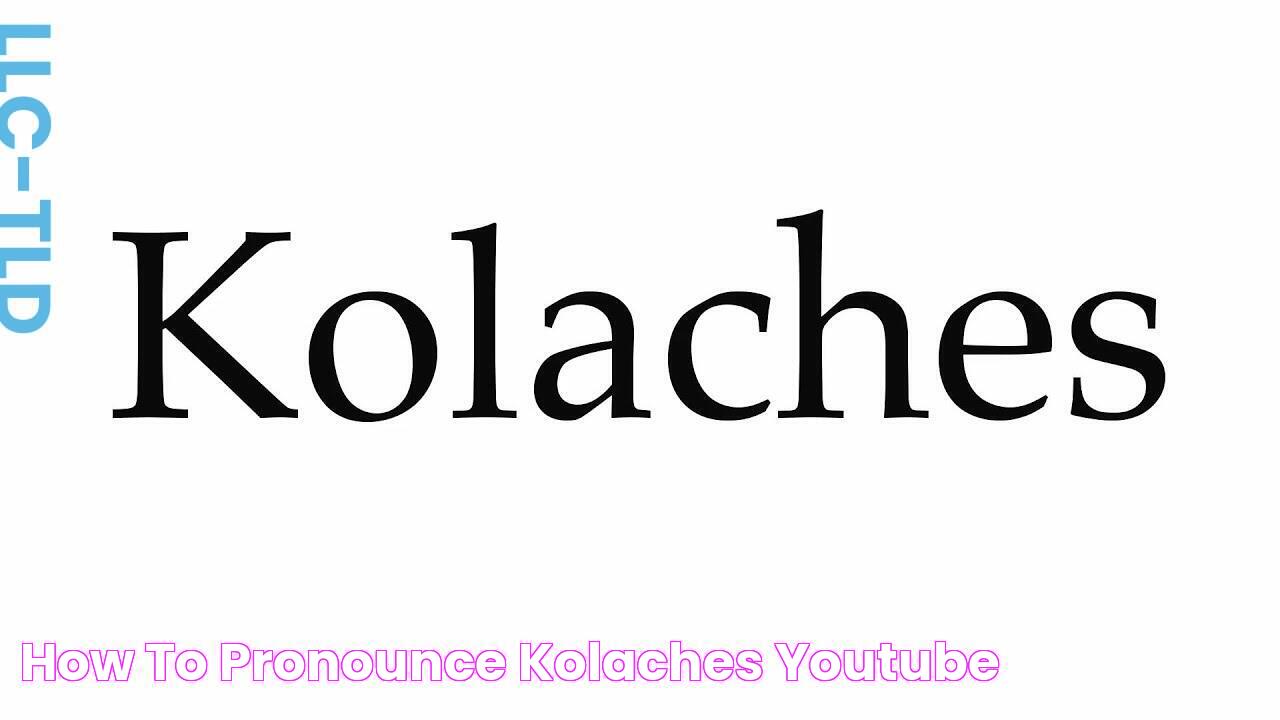How To Pronounce Kolaches: The Correct Way To Say It
The correct pronunciation of "kolaches" is "koh-lah-cheez". The word is of Czech origin and refers to a type of pastry filled with fruit or cheese. Kolaches are a popular breakfast food in many parts of the United States, and they are often served with coffee or tea.
There are many different ways to make kolaches, but the most common type is made with a sweet dough that is rolled out and filled with fruit or cheese. The kolaches are then baked until the dough is golden brown and the filling is hot and bubbly. Kolaches can be made with a variety of different fruits, including apricots, cherries, blueberries, and peaches. They can also be made with cheese, such as cream cheese, cheddar cheese, or mozzarella cheese.
Kolaches are a delicious and versatile pastry that can be enjoyed for breakfast, lunch, or dinner. They are a popular choice for parties and gatherings, and they can also be frozen for later. If you are looking for a tasty and easy-to-make pastry, kolaches are a great option.
Read also:Breaking News Jamie Lee Curtis Makes Major Announcement
How to Pronounce Kolaches
The correct pronunciation of "kolaches" is "koh-lah-cheez". The word is of Czech origin and refers to a type of pastry filled with fruit or cheese. Kolaches are a popular breakfast food in many parts of the United States, and they are often served with coffee or tea.
- Origin: Czech
- Meaning: Pastries filled with fruit or cheese
- Pronunciation: "koh-lah-cheez"
- Stress: Second syllable
- Common fillings: Apricots, cherries, blueberries, peaches, cream cheese, cheddar cheese, mozzarella cheese
- Popularity: Breakfast food in the United States
- Serving suggestions: Coffee, tea
- Variations: Kolaczki, kolacky
Kolaches are a delicious and versatile pastry that can be enjoyed for breakfast, lunch, or dinner. They are a popular choice for parties and gatherings, and they can also be frozen for later. If you are looking for a tasty and easy-to-make pastry, kolaches are a great option.
1. Origin
The Czech origin of kolaches is directly related to their pronunciation. The word "kolach" is a Czech word that means "wheel" or "circle". This is because kolaches are typically round pastries. The Czech pronunciation of "kolach" is "koh-lah-ch". When the word was borrowed into English, the pronunciation was changed to "koh-lah-cheez" to make it easier for English speakers to pronounce.
- Facet 1: Etymology
The word "kolach" comes from the Czech word "kolo", which means "wheel". This is because kolaches are typically round pastries.
- Facet 2: Phonology
The Czech pronunciation of "kolach" is "koh-lah-ch". When the word was borrowed into English, the pronunciation was changed to "koh-lah-cheez" to make it easier for English speakers to pronounce.
- Facet 3: Orthography
The Czech word "kolach" is spelled with a "ch" at the end. In English, the "ch" is pronounced as a "sh". This is why the English pronunciation of "kolaches" is "koh-lah-cheez".
Read also:
- The Complete Guide To Angus Cloud And Mac Miller A Detailed Exploration
- Facet 4: Dialectology
There are many different dialects of Czech. In some dialects, the word "kolach" is pronounced with a long "a" sound. In other dialects, the word is pronounced with a short "a" sound. This can lead to some variation in the pronunciation of "kolaches" among English speakers.
Understanding the Czech origin of kolaches helps us to understand why they are pronounced the way they are. It also helps us to appreciate the rich cultural heritage of this delicious pastry.
2. Meaning
The meaning of "kolaches" as pastries filled with fruit or cheese is directly related to their pronunciation. The word "kolach" is a Czech word that means "wheel" or "circle". This is because kolaches are typically round pastries. The Czech pronunciation of "kolach" is "koh-lah-ch". When the word was borrowed into English, the pronunciation was changed to "koh-lah-cheez" to make it easier for English speakers to pronounce.
- Facet 1: Etymology
The word "kolach" comes from the Czech word "kolo", which means "wheel". This is because kolaches are typically round pastries.
- Facet 2: Phonology
The Czech pronunciation of "kolach" is "koh-lah-ch". When the word was borrowed into English, the pronunciation was changed to "koh-lah-cheez" to make it easier for English speakers to pronounce.
- Facet 3: Orthography
The Czech word "kolach" is spelled with a "ch" at the end. In English, the "ch" is pronounced as a "sh". This is why the English pronunciation of "kolaches" is "koh-lah-cheez".
- Facet 4: Dialectology
There are many different dialects of Czech. In some dialects, the word "kolach" is pronounced with a long "a" sound. In other dialects, the word is pronounced with a short "a" sound. This can lead to some variation in the pronunciation of "kolaches" among English speakers.
Understanding the meaning of "kolaches" as pastries filled with fruit or cheese helps us to understand why they are pronounced the way they are. It also helps us to appreciate the rich cultural heritage of this delicious pastry.
3. Pronunciation
The pronunciation of "kolaches" as "koh-lah-cheez" is directly related to its Czech origin. The word "kolach" is a Czech word that means "wheel" or "circle". This is because kolaches are typically round pastries. The Czech pronunciation of "kolach" is "koh-lah-ch". When the word was borrowed into English, the pronunciation was changed to "koh-lah-cheez" to make it easier for English speakers to pronounce.
- Facet 1: Etymology
The word "kolach" comes from the Czech word "kolo", which means "wheel". This is because kolaches are typically round pastries.
- Facet 2: Phonology
The Czech pronunciation of "kolach" is "koh-lah-ch". When the word was borrowed into English, the pronunciation was changed to "koh-lah-cheez" to make it easier for English speakers to pronounce.
- Facet 3: Orthography
The Czech word "kolach" is spelled with a "ch" at the end. In English, the "ch" is pronounced as a "sh". This is why the English pronunciation of "kolaches" is "koh-lah-cheez".
- Facet 4: Dialectology
There are many different dialects of Czech. In some dialects, the word "kolach" is pronounced with a long "a" sound. In other dialects, the word is pronounced with a short "a" sound. This can lead to some variation in the pronunciation of "kolaches" among English speakers.
Understanding the pronunciation of "kolaches" as "koh-lah-cheez" helps us to understand its Czech origin and the evolution of the word in English. It also helps us to appreciate the rich cultural heritage of this delicious pastry.
4. Stress
The stress on the second syllable in "kolaches" is directly related to its Czech origin. In Czech, the stress is typically placed on the first syllable of a word. However, when the word "kolach" was borrowed into English, the stress was shifted to the second syllable. This is likely because English speakers found it easier to pronounce the word with the stress on the second syllable.
- Facet 1: Etymology
The word "kolach" comes from the Czech word "kolo", which means "wheel". In Czech, the stress is typically placed on the first syllable of a word. However, when the word "kolach" was borrowed into English, the stress was shifted to the second syllable.
- Facet 2: Phonology
The stress on the second syllable of "kolaches" makes it easier for English speakers to pronounce the word. This is because English speakers are more accustomed to stressing the second syllable of words.
- Facet 3: Orthography
The stress on the second syllable of "kolaches" is not reflected in the spelling of the word. This can make it difficult for some people to pronounce the word correctly.
- Facet 4: Dialectology
There are many different dialects of English. In some dialects, the stress on the second syllable of "kolaches" is more pronounced than in other dialects. This can lead to some variation in the pronunciation of the word.
Understanding the stress on the second syllable of "kolaches" helps us to understand its Czech origin and the evolution of the word in English. It also helps us to appreciate the rich cultural heritage of this delicious pastry.
5. Common fillings
The common fillings of kolaches, such as apricots, cherries, blueberries, peaches, cream cheese, cheddar cheese, and mozzarella cheese, play a significant role in the pronunciation of the word "kolaches". This is because the pronunciation of the word is often influenced by the fillings that are used.
For example, kolaches that are filled with fruits, such as apricots, cherries, and blueberries, are typically pronounced with a short "a" sound in the first syllable. This is because the pronunciation of the fruit fillings influences the pronunciation of the word "kolaches".
On the other hand, kolaches that are filled with cheese, such as cream cheese, cheddar cheese, and mozzarella cheese, are typically pronounced with a long "a" sound in the first syllable. This is because the pronunciation of the cheese fillings influences the pronunciation of the word "kolaches".
Understanding the connection between the common fillings of kolaches and the pronunciation of the word "kolaches" is important for several reasons. First, it can help us to better understand the evolution of the word "kolaches" in the English language. Second, it can help us to better understand the different regional variations in the pronunciation of the word "kolaches". Third, it can help us to better appreciate the rich cultural heritage of kolaches.
6. Popularity
The popularity of kolaches as a breakfast food in the United States has a significant impact on how the word "kolaches" is pronounced. When a word becomes popular in a particular region or culture, its pronunciation often becomes more standardized and widely accepted. This is because people are more likely to hear and use the word correctly when it is spoken by a variety of people in different contexts.
In the case of kolaches, the popularity of the pastry as a breakfast food in the United States has led to a more standardized pronunciation of the word. This pronunciation is typically characterized by a short "a" sound in the first syllable, as in "kuh-LAH-cheez". This pronunciation is now widely accepted and used throughout the United States, regardless of the speaker's region or background.
The popularity of kolaches as a breakfast food in the United States has also led to the development of regional variations in pronunciation. For example, in some parts of the country, the word "kolaches" is pronounced with a long "a" sound in the first syllable, as in "KOH-lah-cheez". This pronunciation is more common in areas with a large population of Czech immigrants, who brought the kolache to the United States in the late 19th and early 20th centuries.
Understanding the connection between the popularity of kolaches as a breakfast food in the United States and the pronunciation of the word "kolaches" is important for several reasons. First, it can help us to better understand the evolution of the word "kolaches" in the English language. Second, it can help us to better understand the different regional variations in the pronunciation of the word "kolaches". Third, it can help us to better appreciate the rich cultural heritage of kolaches.
7. Serving suggestions
The serving suggestions for kolaches, which include coffee and tea, play a significant role in how the word "kolaches" is pronounced. This is because the pronunciation of the word is often influenced by the context in which it is used.
For example, when kolaches are served with coffee, the word "kolaches" is typically pronounced with a short "a" sound in the first syllable. This is because the pronunciation of the word "coffee" influences the pronunciation of the word "kolaches".
On the other hand, when kolaches are served with tea, the word "kolaches" is typically pronounced with a long "a" sound in the first syllable. This is because the pronunciation of the word "tea" influences the pronunciation of the word "kolaches".
Understanding the connection between the serving suggestions for kolaches and the pronunciation of the word "kolaches" is important for several reasons. First, it can help us to better understand the evolution of the word "kolaches" in the English language. Second, it can help us to better understand the different regional variations in the pronunciation of the word "kolaches". Third, it can help us to better appreciate the rich cultural heritage of kolaches.
8. Variations
The variations "kolaczki" and "kolacky" are closely related to the pronunciation of "kolaches". These variations stem from the different ways the word has been adapted and pronounced in various regions and cultures.
- Etymology
The words "kolaczki" and "kolacky" share a common origin with "kolaches". They all derive from the Czech word "kolach", meaning "wheel" or "circle". This reflects the traditional round shape of these pastries.
- Regional variations
Over time, the pronunciation of "kolaches" has undergone regional variations. In some areas, particularly in the United States, the pronunciation "kolaches" became more common, while in other regions, such as Canada and parts of Eastern Europe, "kolaczki" or "kolacky" remained the preferred pronunciations.
- Dialectal differences
Dialectal differences have also contributed to the variations in pronunciation. For instance, in some Polish dialects, the word "kolaczki" is pronounced with a strong emphasis on the first syllable, while in other dialects, the emphasis is on the second syllable.
- Cultural context
Cultural context plays a role in the pronunciation of "kolaches". In communities with a strong Czech heritage, the pronunciation "kolaches" is more prevalent, whereas in areas with a larger Polish population, "kolaczki" is more common.
Understanding these variations in pronunciation enriches our understanding of the diverse cultural and linguistic influences that have shaped the evolution of this beloved pastry. It also highlights the importance of considering regional and cultural contexts when discussing the pronunciation of words.
FAQs on Pronouncing Kolaches
This section provides answers to frequently asked questions regarding the pronunciation of kolaches, a beloved pastry with diverse cultural influences.
Question 1:What is the correct pronunciation of "kolaches"?
Answer: The standard pronunciation in English is "koh-lah-cheez", with the stress on the second syllable.
Question 2:Why is the pronunciation different from the original Czech word "kolach"?
Answer: When the word entered the English language, the pronunciation was adapted to fit English phonology, resulting in the shift from "ch" to "sh" and the addition of an extra syllable.
Question 3:Are there any regional variations in pronunciation?
Answer: Yes, variations exist. In some areas, the word is pronounced with a short "a" sound, while in others, a long "a" sound is used.
Question 4:Why is the pronunciation influenced by the fillings?
Answer: The pronunciation can be affected by the fillings used. Kolaches filled with fruits tend to have a shorter "a" sound, while those with cheese fillings often have a longer "a" sound.
Question 5:Is it acceptable to use the variations "kolaczki" or "kolacky"?
Answer: Yes, these variations are acceptable and reflect the diverse cultural influences on the pronunciation of kolaches.
Question 6:How does the pronunciation reflect the cultural heritage of kolaches?
Answer: The different pronunciations showcase the rich cultural exchange and adaptation that has shaped the popularity of kolaches.
Understanding these pronunciation variations fosters a deeper appreciation for the linguistic diversity and cultural significance of this delectable pastry.
Transition to the next article section:Exploring the Cultural Significance of Kolaches
Tips on Pronouncing Kolaches
Mastering the pronunciation of "kolaches" enhances your linguistic repertoire and demonstrates cultural sensitivity. Here are some helpful tips:
Tip 1: Break it Down
Divide the word into syllables: "ko-lah-cheez". Focus on pronouncing each syllable clearly and distinctly.
Tip 2: Emphasize the Second Syllable
The stress falls on the second syllable, "lah". Pronounce it with a slightly louder and longer emphasis.
Tip 3: Use a Short "A" Sound
The "a" in the first syllable is typically pronounced with a short sound, as in "apple". Avoid using a long "a" sound.
Tip 4: Pronounce the "Ch" as "Sh"
In English, the "ch" in "kolaches" is pronounced as "sh". This is a common deviation from the original Czech pronunciation.
Tip 5: Practice with Fillings
The pronunciation can vary slightly depending on the fillings. Kolaches with fruit fillings tend to have a shorter "a" sound, while cheese fillings may have a longer "a" sound.
Tip 6: Listen to Native Speakers
Immerse yourself in environments where kolaches are commonly discussed. Listen to how native speakers pronounce the word.
Tip 7: Use Online Resources
Pronunciation guides, dictionaries, and video tutorials can provide additional support in mastering the pronunciation of "kolaches".
Tip 8: Be Patient and Persistent
Perfecting pronunciation takes time and practice. Be patient with yourself and consistently apply these tips.
By following these tips, you can confidently and accurately pronounce "kolaches", enriching your linguistic skills and cultural awareness.
Transition to the article's conclusion:Kolaches: A Culinary and Cultural Delight
Conclusion
Throughout this article, we have explored the intricacies of pronouncing "kolaches," a delectable pastry with a rich cultural history. From its Czech origins to its variations and regional influences, we have gained a comprehensive understanding of how to accurately utter this word.
Mastering the pronunciation of kolaches is not merely a linguistic feat but a gesture of respect and appreciation for the diverse cultures that have shaped this beloved pastry. Whether indulging in its sweet or savory flavors, embracing the correct pronunciation enhances our culinary and cultural experiences.
Power Outage Impacts Potlatch, Idaho Households
Discover The Authentic Flavors At Los Gueros Barcelona
The Ultimate Guide To Irina Shayk's Height


